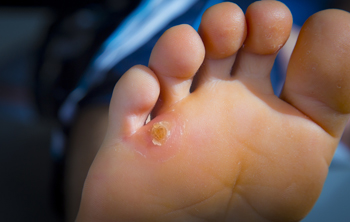 Plantar warts are small growths that mainly appear at the bottom of your foot and are a common viral skin infection. Unfortunately, they spread easily and being cautious in certain public spaces is key to protecting your feet. One public space to be especially vigilant in is the gym. It is important to always wear shoes at the gym, specifically near pools, in locker rooms and showers. Simply keeping a pair of shower shoes or flip flops in your gym bag helps to keep your feet safe from the multitude of bacteria that they would otherwise be exposed to. Additionally, any cuts or small wounds should always be covered. If you have a cut, it is also a good idea to stay away from saunas and hot tubs until it is healed. Covering your feet in order to prevent contact with an infected area is the best way to avoid these uncomfortable warts. If you think you may have contracted plantar warts, it is recommended that you speak to a podiatrist to receive proper treatment.
Plantar warts are small growths that mainly appear at the bottom of your foot and are a common viral skin infection. Unfortunately, they spread easily and being cautious in certain public spaces is key to protecting your feet. One public space to be especially vigilant in is the gym. It is important to always wear shoes at the gym, specifically near pools, in locker rooms and showers. Simply keeping a pair of shower shoes or flip flops in your gym bag helps to keep your feet safe from the multitude of bacteria that they would otherwise be exposed to. Additionally, any cuts or small wounds should always be covered. If you have a cut, it is also a good idea to stay away from saunas and hot tubs until it is healed. Covering your feet in order to prevent contact with an infected area is the best way to avoid these uncomfortable warts. If you think you may have contracted plantar warts, it is recommended that you speak to a podiatrist to receive proper treatment.
Plantar warts can be very uncomfortable. If you need your feet checked, contact one of our podiatrists from Carolina Foot & Ankle. Our doctors will assist you with all of your foot and ankle needs.
About Plantar Warts
Plantar warts are the result of HPV, or human papillomavirus, getting into open wounds on the feet. They are mostly found on the heels or balls of the feet.
While plantar warts are generally harmless, those experiencing excessive pain or those suffering from diabetes or a compromised immune system require immediate medical care. Plantar warts are easily diagnosed, usually through scraping off a bit of rough skin or by getting a biopsy.
Symptoms
- Lesions on the bottom of your feet, usually rough and grainy
- Hard or thick callused spots
- Wart seeds, which are small clotted blood vessels that look like little black spots
- Pain, discomfort, or tenderness of your feet when walking or standing
Treatment
- Freezing
- Electric tool removal
- Laser Treatment
- Topical Creams (prescription only)
- Over-the-counter medications
To help prevent developing plantar warts, avoid walking barefoot over abrasive surfaces that can cause cuts or wounds for HPV to get into. Avoiding direct contact with other warts, as well as not picking or rubbing existing warts, can help prevent the further spread of plantar warts. However, if you think you have developed plantar warts, speak to your podiatrist. He or she can diagnose the warts on your feet and recommend the appropriate treatment options.
If you have any questions please feel free to contact one of our offices located in Huntersville Office | 16419 Northcross Dr Suite A, Huntersville, NC 28078; Mooresvillle Office | 206 Joe Knox Avenue Suite D, Mooresville, NC 28117; and Mountain Island | 10310 Couloak Drive Suite 200, Charlotte, NC 28216 . We offer the newest diagnostic and treatment technologies for all your foot and ankle needs.
